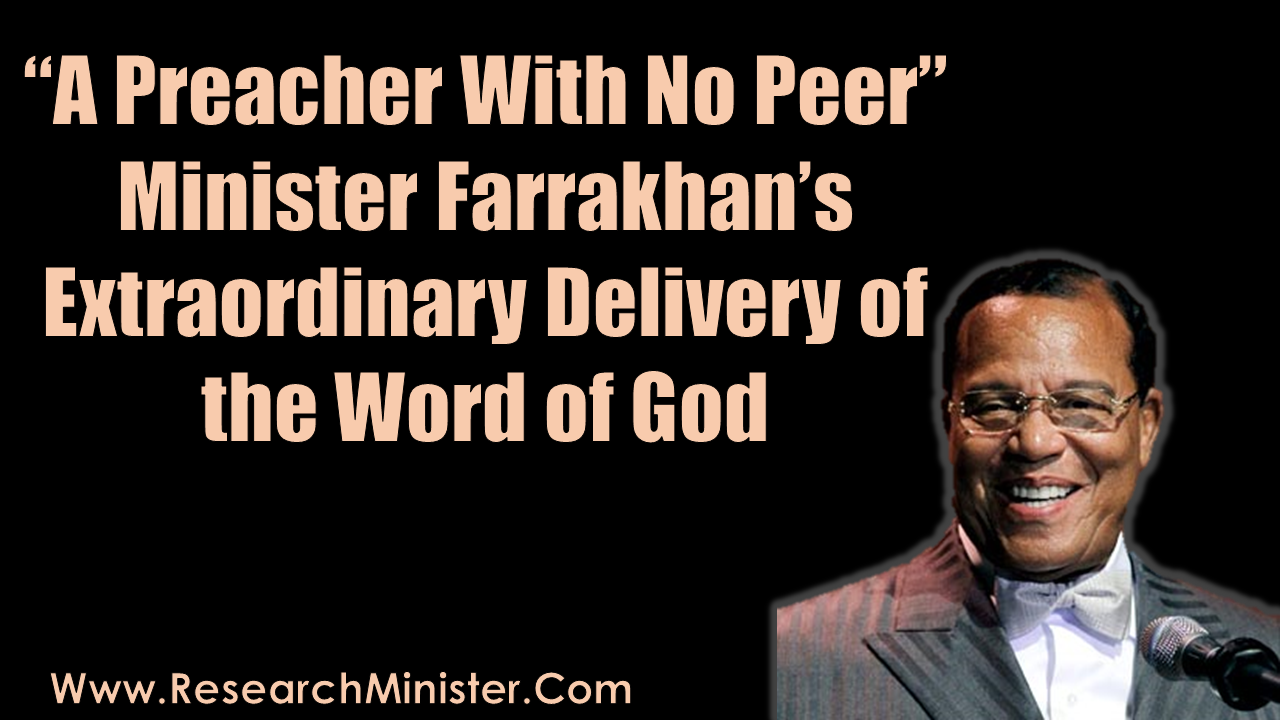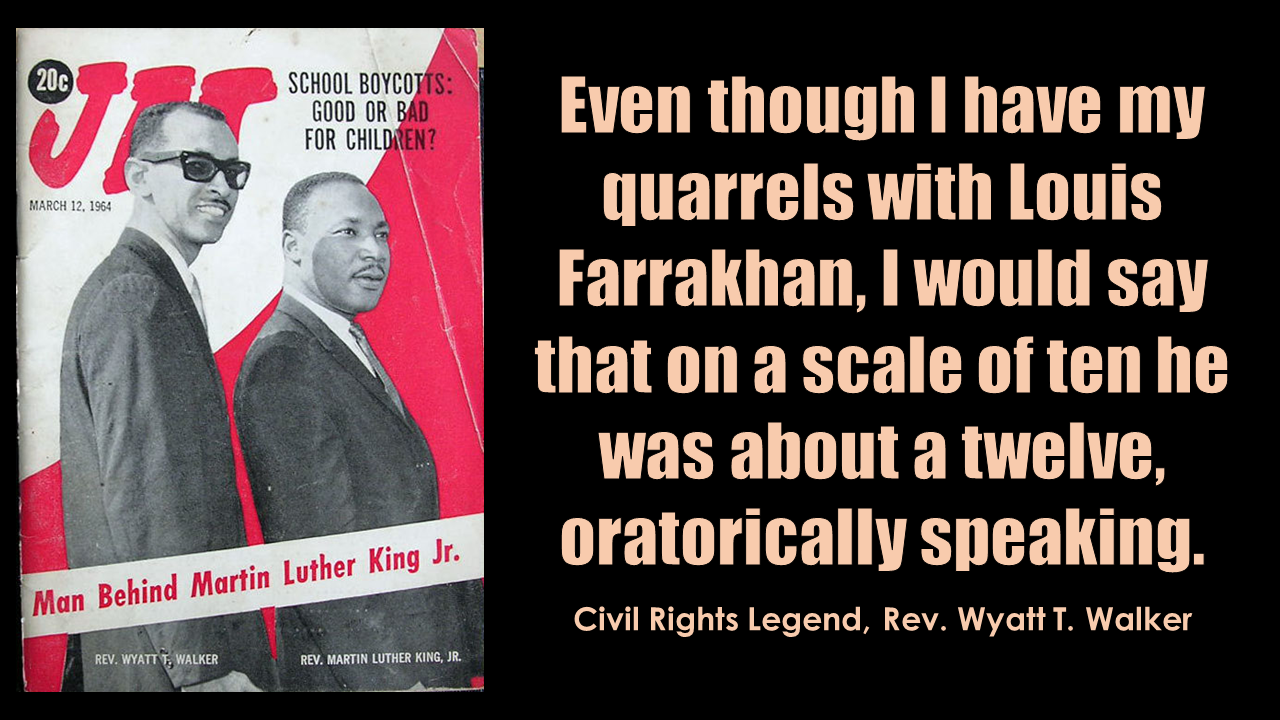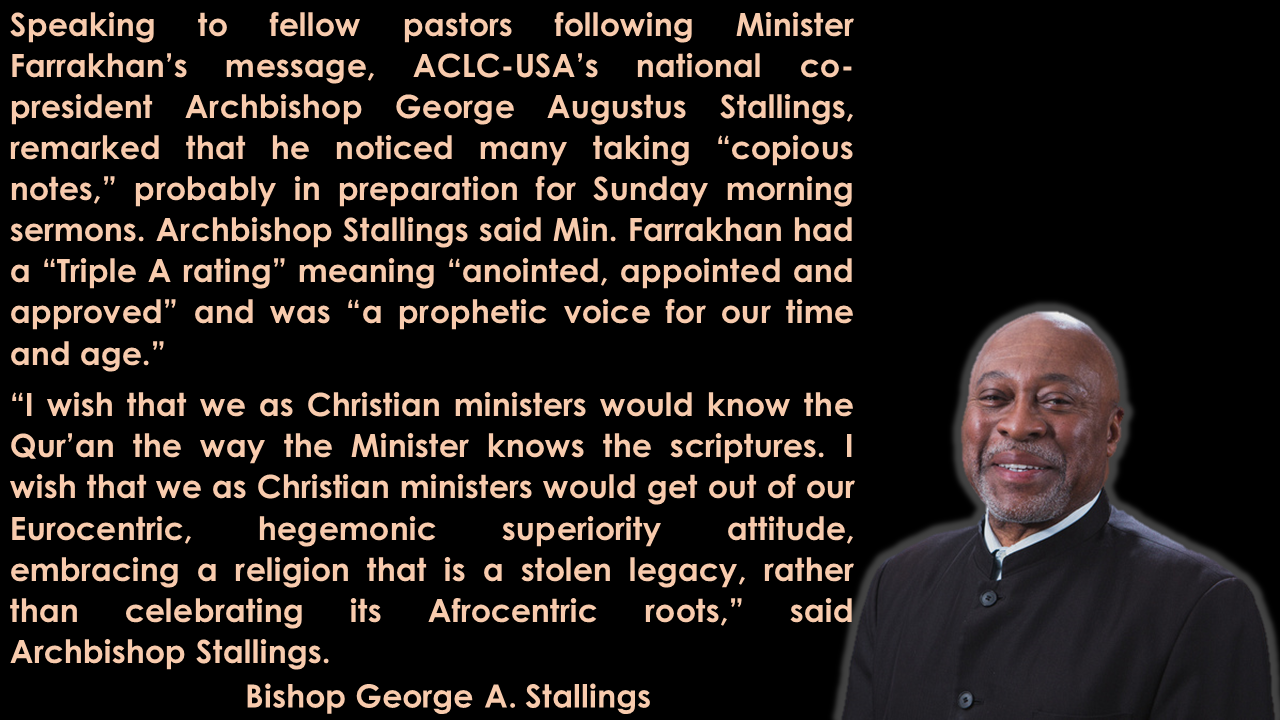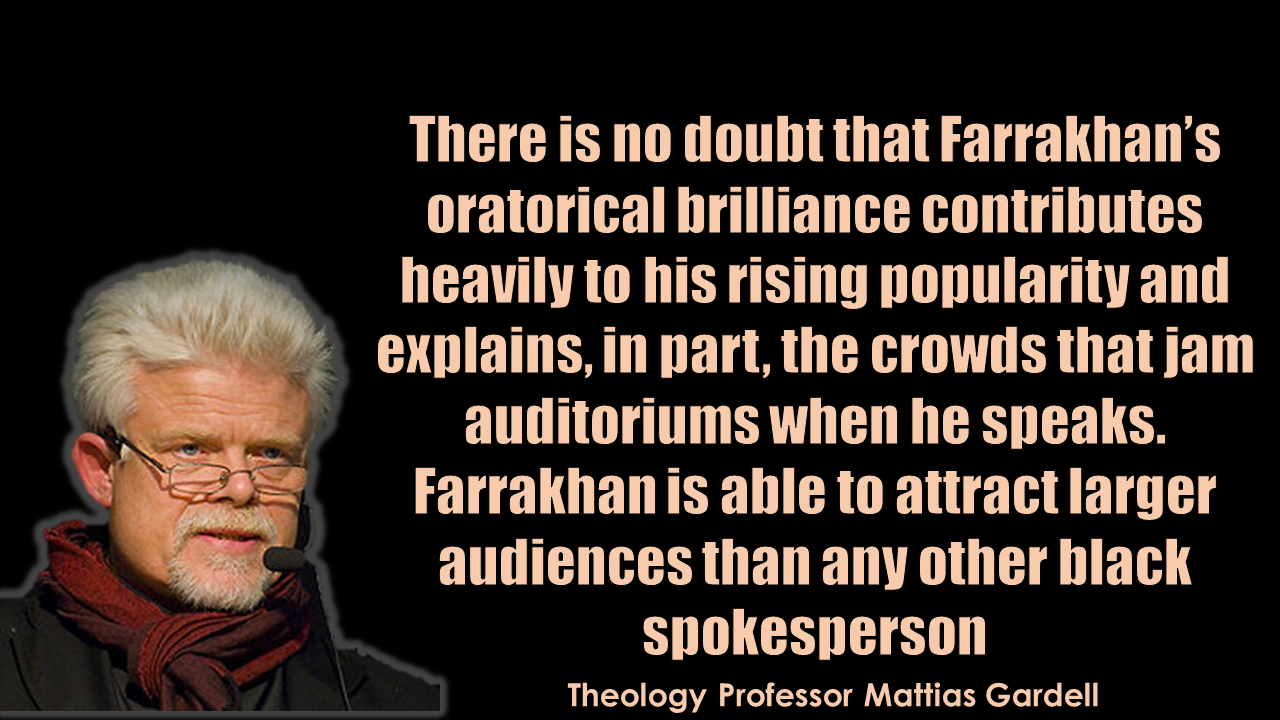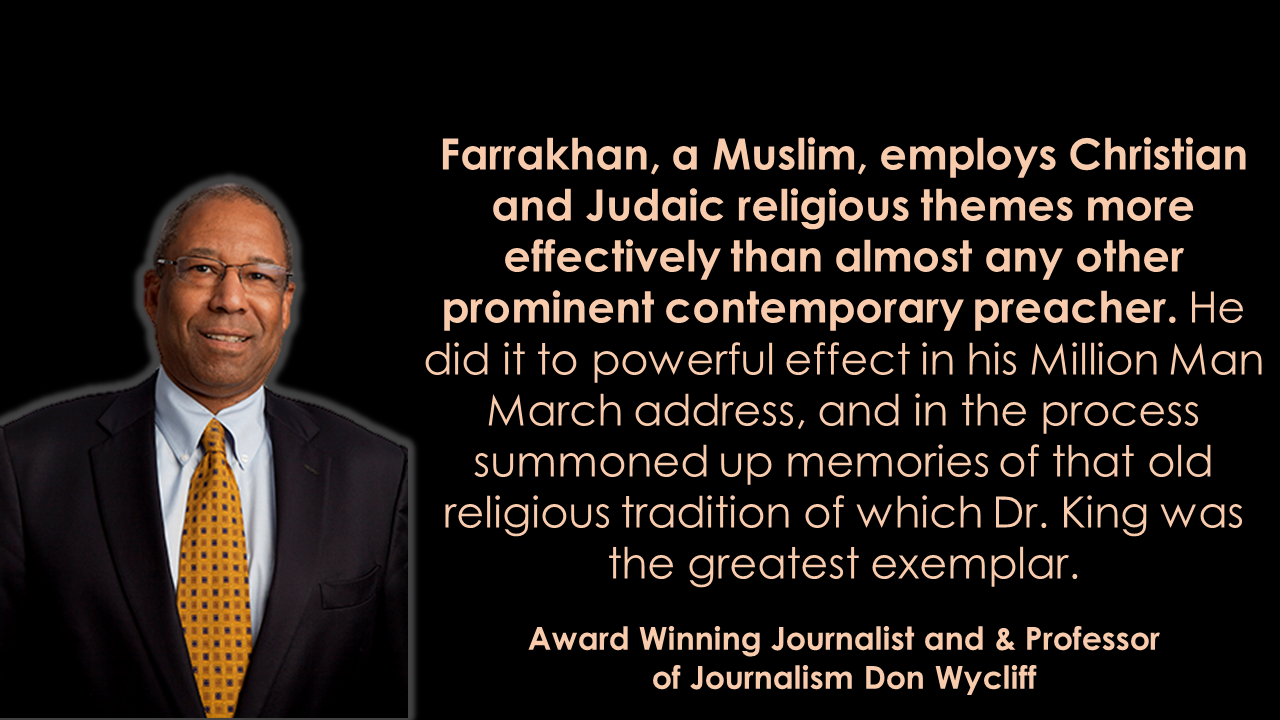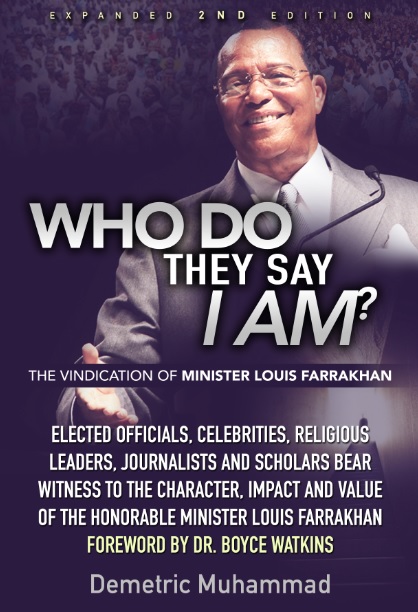“A PREACHER WITH NO PEER” MINISTER FARRAKHAN’S EXTRAORDINARY DELIVERY OF THE WORLD OF GOD
RESEARCHMINISTER.COM is happy to take a look today at a brief history of some of the significant men and women, who over the years have reacted to the Ministry of Minister Farrakhan. Certainly, the Minister is many thing to many people, but he is, as his title denotes, a “Minister.” To be a Minister is to be a servant and in its normal connotation, preaching and teaching is the implied activity of one who bears such a title. The observations below are a part of the treasure of testimonies contained in the groundbreaking book Who Do They Say I Am: The Vindication of Minister Louis Farrakhan. These observations and reactions help us to understand, more fullly, why the Most Honorable Elijah Muhammad once told Minister Farrakhan that the Minister is a “star with no equal.” Today, with both qualitative and quantitative data, we can prove and demonstrate how profoundly true the Most Honorable Elijah Muhammad was and is in his designation of Minister Farrakhan as a “star with no equal.”
REV. ELISHA B. MORRIS: Minister Louis Farrakhan just put the Bible on the top of the WORD NETWORK like no preacher, pastor, reverend has done in over a dozen years. He stood up for the word of God and Jesus and then called on us to come together and restore order as Christians and Muslims. Get the DVD!!! He said what a few of us have been saying, we are not sheep we are soldiers in the army and we fight for He whom died for us or we really aren’t for HIM! (Morris 2015)
REV. WYATT T. WALKER & REV JAMES A. FORBES: Talk story about Minister Louis Farrakhan’s sermon at the Million Man March. Henry Louis Gates, Jr., asks five masters of black sacred oratory to give a strictly professional assessment of a colleague’s delivery. THE REVEREND WYATT T. WALKER (Canaan Baptist Church, Harlem): Even though I have my quarrels with Louis Farrakhan, I would say that on a scale of ten he was about a twelve, oratorically speaking. THE REVEREND JAMES A. FORBES (Riverside Church, Harlem): As a piece of communication, it was an extraordinary moment. In terms of style, especially in his public condemnation of the President and whites, and so forth, there was a balance of courtesy and critique that I liked. (Gates 1995, 33)
REV. JEREMIAH A. WRIGHT JR.: “When Minister Farrakhan speaks, Black America listens,” says the Rev. Dr. Jeremiah A. Wright, likening the Minister’s influence to the E. F. Hutton commercials of old. “Everybody may not agree with him, but they listen … His depth of analysis when it comes to the racial ills of this nation is astounding and eye opening He brings a perspective that is helpful and honest.
“Minister Farrakhan will be remembered as one of the 20th and 21st century giants of the African American religious experience,” continues Wright. “His integrity and honesty have secured him a place in history as one of the nation’s most powerful critics. His love for Africa and African American people has made him an unforgettable force, a catalyst for change and a religious leader who is sincere about his faith and his purpose.” (Media Matters for America 2008)
ARCHBISHOP GEORGE AUGUSTUS STALLINGS: Speaking to fellow pastors following Minister Farrakhan’s message, ACLC-USA’s national co-president Archbishop George Augustus Stallings, remarked that he noticed many taking “copious notes,” probably in preparation for Sunday morning sermons. Archbishop Stallings said Min. Farrakhan had a “Triple A rating” meaning “anointed, appointed and approved” and was “a prophetic voice for our time and age.”
“I wish that we as Christian ministers would know the Qur’an the way the Minister knows the scriptures. I wish that we as Christian ministers would get out of our Eurocentric, hegemonic superiority attitude, embracing a religion that is a stolen legacy, rather than celebrating its Afrocentric roots,” said Archbishop Stallings.
“I wish that some of us would seek to purify our Christianity. We cannot purify our Christianity until we study the Qur’an. I know that’s a shocking statement to some of you Christian folks, but you and I cannot appreciate the true heritage of Christianity until we know the Qur’an, until we know Muhammad (PBUH) until we can articulate the principles of the Islamic faith the way the Hon. Louis Farrakhan articulated the principles of the Christian faith, and not only the Christian faith but also the Jewish faith,” Archbishop Stallings added. (A. Muhammad, Farrakhan to spiritual leaders: ‘God has never done His greatest work in politics’ 2009)
Archbishop George Augustus Stallings, Jr., national president of the American Clergy Leadership Conference, said he admires Minister Farrakhan because he leads by example, and is a man of principle, at a time when many spiritual leaders sacrifice principle for popularity.
“The sterling quality that I appreciate most about the Honorable Minister Louis Farrakhan is that he is uncompromising when it comes to spiritual principles and he does not base his message on what will tickle the ear or what is popular to receive an applause,” Archbishop Stallings told The Final Call. “What is more important to him is principle rather than power. It is service rather than being served. And it is his ability to challenge all of us to be the watchmen and the watchwomen that we accepted the call to be when we were ordained and yet maybe have fallen by the wayside.” (A. Muhammad, Farrakhan delivers a warning and offers a healing for spiritual leaders and humanity 2011)
THEOLOGY PROFESSOR MATTIAS GARDELL: His long lectures are composed much like orchestral numbers. He starts by displaying a theme, and then varies the expressions, moving his audience to tears and laughter, serious consideration and explosive anger, before reaching the grand finale in which he dramatically drives his points through. Farrakhan combines a number of diverse roles during each sermon, such as the strong warrior, the trickster, the stern father, the heart warmer, the stand-up comedian, the encyclopedic scholar and the Doomsday prophet. As is common in the black church, a kind of dialogue is established as the preaching evokes responses from the audience, with the worshipers shouting cries of approval such as “That’s right,” “Tell it like it is,” “Go on, Minister, go on,” and “Teach, Brother teach.”
There is no doubt that Farrakhan’s oratorical brilliance contributes heavily to his rising popularity and explains, in part, the crowds that jam auditoriums when he speaks. Farrakhan is able to attract larger audiences than any other black spokesperson: 35,000 people showed up at Madison Square Garden, New York; 17,000 in Los Angeles; 26,000 in Detroit; 19,000 and then 15,000 in Atlanta; 15,000 in Chicago; 21,000 at Jacob Javits Center in New York, and 10,000 in Baltimore. (Gardell 1996)
NOW AVAILABLE
